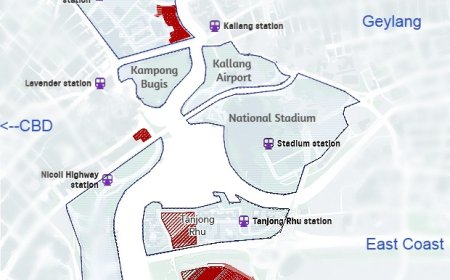Landlord’s Step-by-Step Guide to Evicting a Tenant in Singapore
Learn the legal process for evicting problematic tenants in Singapore. Step-by-step eviction procedures, legal requirements, and alternatives explained.

In Singapore, eviction is a legal process that enables landlords to remove tenants who have breached the terms of their tenancy agreement. It serves as a decisive measure to protect the property and prevent ongoing or future violations.
While landlords may encounter several situations that cause frustration, eviction can only be legally pursued if there is a clear breach of the tenancy contract. Section 15 of the Control of Rent Act outlines specific circumstances that may justify eviction, including:
-
Non-payment or persistent late payment of rent
-
Damage to the property beyond normal wear and tear
-
Engagement in illegal activities on the premises that could create legal liabilities for the landlord, such as unlawful subletting
If any of these breaches occur, the landlord may initiate the eviction process in accordance with Singapore law.
Step-by-Step Process for Evicting a Tenant in Singapore
Step 1: Issue a Written Termination of Tenancy Notice
Under Section 18 of the Conveyancing and Law of Property Act, a landlord must serve the tenant with a formal written notice of termination. This notice should:
-
Clearly state the nature of the breach
-
Provide instructions on how the tenant can remedy the breach (if applicable)
-
Specify the termination notice period as stated in the tenancy agreement
-
Indicate the deadline by which the tenant must vacate the premises
For instance, if the breach is non-payment of rent, the notice should demand full payment of the outstanding amount. If the breach involves property damage, it should require reimbursement for repair or replacement costs.
If the tenant complies within the stated period, the tenancy may continue. If not, the landlord may proceed to legal enforcement.
Step 2: Obtain a Court Order to Enforce the Tenancy Notice
If the tenant refuses to comply with the termination notice, the landlord must apply to court for enforcement. The legal route depends on the value of the claim:
-
Small Claims Tribunals – For claims up to SGD 20,000
-
Magistrate’s Court or District Court – For higher claims
The court must issue a judgment in the landlord’s favor before further steps can be taken.
Step 3: Apply for an Enforcement Order for Possession of Property
Once a court order is obtained and the tenant still does not comply, the landlord may apply for an enforcement order for possession of property (previously known as a writ of possession).
This order authorizes the Sheriff or a Bailiff to:
-
Enter the premises (using force if necessary)
-
Take possession of the tenant’s belongings
-
Sell seized items to recover outstanding debts
For non-payment of rent cases, Section 18A of the Conveyancing and Law of Property Act grants the tenant four weeks to settle arrears before the enforcement order is approved. In other cases, the court will assess the tenant’s objections, if any, before granting the order.
Step 4: Execute the Eviction
On the scheduled eviction date, the landlord or an authorized agent must be present. The Sheriff or Bailiff will:
-
Serve eviction papers
-
Inventory all items within the property
-
Remove the tenant from the premises
Tenants who refuse to leave may be charged double rent or face criminal trespass charges.
Post-Eviction Measures
After eviction, the landlord should immediately:
-
Change all locks to prevent unauthorized re-entry
-
Inspect the property for damages
-
Prepare the unit for the next tenant
The evicted tenant cannot re-enter the property without the landlord’s consent.
Alternatives to Eviction
Eviction is a last-resort measure. In cases where the tenant is otherwise cooperative but has payment issues, a landlord may consider applying for a writ of distress.
This court order allows the landlord to:
-
Seize the tenant’s possessions
-
Retain them until rent is paid
-
Sell them to recover unpaid rent if the tenant fails to pay
Unlike eviction, this method allows the tenancy to continue while recovering the outstanding rent.
Professional Advice is Strongly Recommended
Evicting a tenant is a sensitive legal process with serious consequences for both parties. It is advisable to consult a qualified lawyer before taking action to ensure compliance with Singapore’s property and tenancy laws.
1. Can a landlord evict a tenant without a valid reason in Singapore?
No. A landlord must have a lawful reason supported by a breach of the tenancy agreement, such as unpaid rent, property damage, or illegal activities on the premises. Eviction without a legal basis can lead to court action against the landlord.
2. What legal documents are required to start the eviction process?
The landlord must first issue a written termination of tenancy notice stating the reason for eviction, the breach committed, and the time frame for the tenant to vacate. If the tenant does not comply, the landlord must apply for a court order.
3. How long does the eviction process take in Singapore?
The duration varies depending on court schedules and whether the tenant contests the eviction. In straightforward cases, it can take several weeks to a few months from notice to final eviction.
4. Can I change the locks before the eviction is complete?
No. Changing locks before a court order is issued is considered illegal self-help eviction and may result in legal penalties. Locks should only be changed after the tenant has been legally removed.
5. What happens to the tenant’s belongings after eviction?
The Sheriff or Bailiff will inventory the items, and they may be seized and sold to cover outstanding debts. Items left behind after eviction are handled according to the enforcement order.
6. Is eviction the only option for a tenant who does not pay rent?
No. Landlords can consider applying for a writ of distress, which allows seizure of the tenant’s belongings to recover rent while keeping the tenancy active.
7. What costs should a landlord expect during the eviction process?
Costs may include legal fees, court filing fees, and attendance fees for the Sheriff or Bailiff. These costs can sometimes be recovered from the tenant through court orders.
8. Can a tenant resist an eviction order?
Yes. Tenants can apply to the court to oppose eviction. The court will review the reasons and decide whether to grant or deny the enforcement order for possession of property.
9. What should a landlord do after a successful eviction?
Change the locks immediately, inspect the property for damages, and prepare it for the next tenant. Ensure all legal and safety checks are completed before re-leasing.
10. Should I consult a lawyer before starting the eviction process?
Yes. Professional legal advice ensures that all actions comply with Singapore law and helps avoid procedural errors that could delay or invalidate the eviction.
Algene Toh
Disclaimer: The information presented on BSR2.com is intended for general informational purposes only. It does not constitute legal, financial, investment, or real estate advice and should not be relied upon as such. While every effort has been made to ensure the accuracy, reliability, and completeness of the content at the time of publication, all data is derived from publicly available sources and may be subject to change without notice. BSR2.com makes no representations or warranties of any kind, express or implied, regarding the suitability, timeliness, or accuracy of the information provided for any specific purpose. Users are strongly encouraged to seek independent advice from qualified professionals before making any decisions based on the content found on this website. BSR2.com shall not be held liable for any loss, damage, or consequence, whether direct or indirect, arising from the use of or reliance on the information provided. The content is intended as a general guide and does not take into account individual circumstances.
What's Your Reaction?
 Like
0
Like
0
 Dislike
0
Dislike
0
 Love
0
Love
0
 Funny
0
Funny
0
 Angry
0
Angry
0
 Sad
0
Sad
0
 Wow
0
Wow
0













































